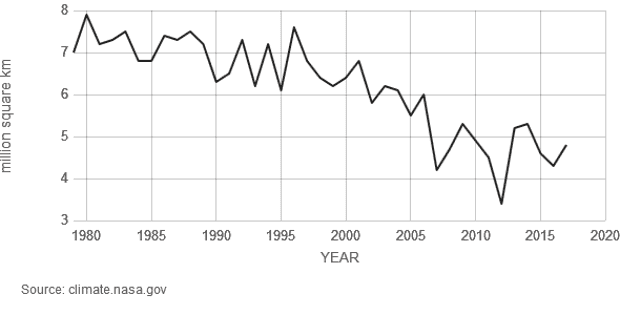Pollution is slowing the melting of Arctic sea ice, for now
Posted on 7 August 2018 by John Abraham
The Arctic is one of the “canaries in the coal mine” for climate change. Long ago, scientists predicted it would warm quicker than other parts of the planet, and they were right. Currently, the Arctic is among the fastest-warming places on the planet. Part of the reason is that as the Arctic warms, ice melts and ocean water is uncovered. The ocean is darker than ice so it in turn absorbs more sunlight and increases its warming. This is a feedback loop.
Another reason is that the Arctic doesn’t get that much sunlight so increased energy from the atmosphere has a bigger influence there than it would have elsewhere.
Scientists have looked to the Arctic for clues and hints of human climate change over the past decades. The fact that the Arctic is warming has led to a 70% reduction in the volume of summer sea ice – an enormous loss of ice.

Decline in September Arctic ice extent (not volume). Illustration: Nasa
A recent paper just published in the Journal of Climate by the American Meteorological Society takes an in-depth look at how fast the Arctic ice is melting and why. According to the paper, the authors completed a detection and attribution study of Arctic sea ice decline from 1953 to 2012. That is 60 years of data that tell the picture of climate change. The “detection” part of this study was about detecting what long-term trends are apparent over these six decades. The “attribution” part of the study is figuring out what is the cause of the trends.
Why six decades? Well the authors wanted to go back as far as they could while still accessing high-quality records of the ice extent. They used three different sets of data that record the extent of ice in the region.
In terms of attribution, the authors looked for “fingerprints” of human activity. Humans emit greenhouse gases that trap heat. We know that and we have known that for a long time. Greenhouse gases make the Arctic warmer. But, other things are happening too. There are natural changes to the Arctic. There are also other human pollutants that affect the ice. For instance, humans emit small particles called “aerosols” that can get into the atmosphere and block sunlight. So, these human aerosol emissions can actually cause cooling.
The authors concluded that the combined cooling effect from human aerosols was detected in all three datasets of ice. That means, it didn’t matter whose measurements you used – the effect of aerosol cooling was present.
So how much of an effect do aerosols have? It turns out 23% of the warming caused by greenhouse gases was offset by the cooling from aerosols. Unfortunately, this isn’t good news. It means that if/when humans reduce our aerosol pollution, the warming in the Arctic and the ice loss there will be worse.
This puts us into a Faustian bargain. We want to reduce airborne pollution, like sulfur aerosols. But, if we do that, it makes the effects of greenhouse gas pollution worse.































 Arguments
Arguments






























I'm curious about attribution to black carbon. Is this well-estimated?
I thought coal fired electricity generation was required to filter out sulphate aerosols? So do some countries do this better than others?
Or are other aerosols contributing?
Likely, as the asians increase their individual wealth, they will demand that their governments clean up their air. This should be a fascinating experiment. The technology is off the shelf. Many years ago America put in particulate scrubbers and sulphur scrubbers which were very effective. China, for instance, could buy the technology off the shelf and install it or alternately, buy a few and reverse engineer them. Possibly they don't want their population to live long lives. Big pension payouts.
Willian,
In the USA currently the coal pollution kills over 10,000 people each year. Coal barons and the Republican party think it is too expensive to equip old coal power plants to reduce pollution. Most of the regulations in Obama's clean power plan forced reductions of particulate and sulphur pollution with carbon reduction as a side effect.
China is flat out replacing old inefficient polluting coal plants with new, high efficiency clean ones. They dont want discontent about polution causing a challenge to the government. See here for more information. Note fig 1 and Fig 3 in particular. I have done some work on chinese plants - I believe they are mostly taking up Japanese technology while inventing their own.
Yup, M.Sweet@4.
But digging coal provides jobs! But at the cost of about 1 person for every seven job-years. The math: About 70,000 people have jobs directly mining coal. So 70,000 people work for a year, and 10,000 other people downwind die. Hire 700 more for a year, 100 people die.
Two miners working for 35 years each, for 70 job-years, and 10 people die. And as a bonus, the Earth gets warmer!